Related Research Articles
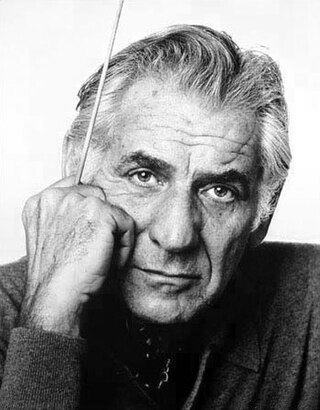
Leonard Bernstein was an American conductor, composer, pianist, music educator, author, and humanitarian. Considered to be one of the most important conductors of his time, he was the first American conductor to receive international acclaim. Bernstein was "one of the most prodigiously talented and successful musicians in American history" according to music critic Donal Henahan. Bernstein received numerous honors and accolades including seven Emmy Awards, two Tony Awards, and 16 Grammy Awards as well as an Academy Award nomination. He received the Kennedy Center Honor in 1981.
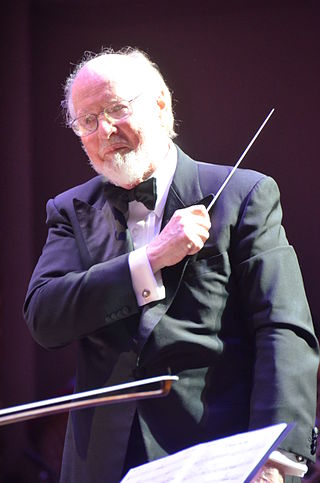
John Towner Williams is an American composer, conductor, and pianist. In a career that has spanned seven decades, he has composed some of the most popular, recognizable and critically acclaimed film scores in cinema history. Williams has won 25 Grammy Awards, five Academy Awards, seven British Academy Film Awards, and four Golden Globe Awards. With 53 Academy Award nominations, he is the second-most nominated person, after Walt Disney. His compositions are often considered the epitome of orchestral film music and he is considered among the greatest composers in the history of cinema. Williams is known for his collaborations with Steven Spielberg and George Lucas, and has worked with such diverse directors as Alfred Hitchcock, Brian De Palma, Robert Altman, Chris Columbus, Oliver Stone, Richard Donner, Irvin Kershner, Sydney Pollack, Mark Rydell, Mark Robson, Jean-Jacques Annaud, and J. J. Abrams. He has a very distinct sound that mixes romanticism, impressionism and atonal music with complex orchestration.

The Boston Pops Orchestra is an American orchestra based in Boston, Massachusetts, specializing in light classical and popular music. The orchestra's current music director is Keith Lockhart.

William Howard Schuman was an American composer and arts administrator.
The 6th Annual Grammy Awards were held on May 12, 1964, at Chicago, Los Angeles and New York. They recognized accomplishments by musicians for the year 1963. Henry Mancini won 4 awards.
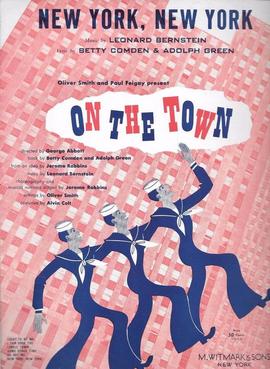
"New York, New York" is a song from the 1944 musical On the Town and the 1949 MGM musical film of the same name. The music was written by Leonard Bernstein and the lyrics by Betty Comden and Adolph Green. A well known line of this song is:
New York, New York, a helluva town. The Bronx is up but The Battery's down.

Mass is a musical theatre work composed by Leonard Bernstein with text by Bernstein and additional text and lyrics by Stephen Schwartz. Commissioned by Jacqueline Kennedy, it premiered on September 8, 1971, conducted by Maurice Peress and choreographed by Alvin Ailey. The production used costume designs by Frank Thompson. The performance was part of the opening of the John F. Kennedy Center for the Performing Arts in Washington, D.C. Mass premiered in Europe in 1973, with John Mauceri conducting the Yale Symphony Orchestra in Vienna.
Summon the Heroes is a one-movement orchestral composition written for the 1996 Summer Olympics by American composer John Williams for the National Broadcasting Company (NBC). It premiered on July 19, 1996, in abridged form, at the opening ceremony in Atlanta, Georgia, played by the Atlanta Symphony Orchestra and conducted by Williams. The piece is the third of four compositions he has written for the Olympics, following 1984's Olympic Fanfare and Theme and 1988's Olympic Spirit, and preceding 2002's Call of the Champions.
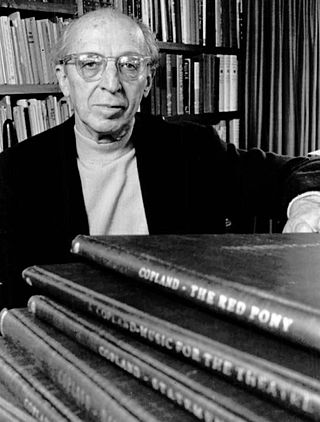
Connotations is a classical music composition for symphony orchestra written by American composer Aaron Copland. Commissioned by Leonard Bernstein in 1962 to commemorate the opening of Philharmonic Hall in New York City, United States, this piece marks a departure from Copland's populist period, which began with El Salón México in 1936 and includes the works he is most famous for such as Appalachian Spring, Lincoln Portrait and Rodeo. It represents a return to a more dissonant style of composition in which Copland wrote from the end of his studies with French pedagogue Nadia Boulanger and return from Europe in 1924 until the Great Depression. It was also Copland's first dodecaphonic work for orchestra, a style he had disparaged until he heard the music of French composer Pierre Boulez and adapted the method for himself in his Piano Quartet of 1950. While the composer had produced other orchestral works contemporary to Connotations, it was his first purely symphonic work since his Third Symphony, written in 1947.

The Tanglewood Music Center is an annual summer music academy in Lenox, Massachusetts, United States, in which emerging professional musicians participate in performances, master classes and workshops. The center operates as a part of the Tanglewood Music Festival, an outdoor concert series and the summer home of the Boston Symphony Orchestra (BSO).

Alexander Frey, KM, KStJ, is an American symphony orchestra conductor, virtuoso organist, pianist, harpsichordist and composer. Frey is in great demand as one of the world's most versatile conductors, and enjoys success in the concert hall and opera house, and in the music of Broadway and Hollywood. Leonard Bernstein referred to him as "a wonderful spirit".

Leonard Bernstein's Symphony No. 2 The Age of Anxiety is a piece for orchestra and solo piano. The piece was composed from 1948 to 1949 in the United States and Israel, and was revised in 1965. It is titled after W. H. Auden's eponymous poem, and dedicated to Serge Koussevitzky.
The Trombone Concerto is a concerto for trombone and orchestra by the American composer Christopher Rouse. The work was commissioned by the New York Philharmonic for its principal trombonist Joseph Alessi. It was completed on April 5, 1991, and was first performed by Alessi and the New York Philharmonic conducted by Leonard Slatkin on December 30, 1992, in Avery Fisher Hall, New York City. The concerto is dedicated to the composer and conductor Leonard Bernstein, who died suddenly October 14, 1990. In 1993, the work was awarded the Pulitzer Prize for Music.

Black conductors are musicians of African, Caribbean, African-American ancestry and other members of the African diaspora who are musical ensemble leaders who direct classical music performances, such as an orchestral or choral concerts, or jazz ensemble big band concerts by way of visible gestures with the hands, arms, face and head. Conductors of African descent are rare, as the vast majority are male and Caucasian.
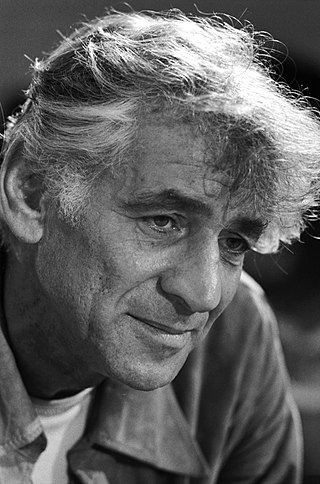
Opening Prayer is a composition for baritone and orchestra, written for the reopening of Carnegie Hall in 1986. Composer Leonard Bernstein set a Hebrew biblical benediction, which concludes a traditional morning service. He derived the music from an earlier piano composition, and later included it in his Jubilee Games in 1988, and in their expansion to the Concerto for Orchestra in 1989, calling the movement now Benediction.
The Short Symphony, or Symphony No. 2, is a symphony written by the American composer Aaron Copland from 1931 to 1933. The name derives from the symphony's short length of only 15 minutes. The work is dedicated to Copland's friend, the Mexican composer and conductor Carlos Chávez. The symphony's first movement is in sonata-allegro form, and its slow second movement follows an adapted ternary form. The third movement resembles the sonata-allegro but has indications of cyclic form. The composition contains complex rhythms and polyharmonies, and it incorporates the composer's emerging interest in serialism as well as influences from Mexican music and German cinema. The symphony includes scoring for a heckelphone and a piano while omitting trombones and a percussion section. Copland later arranged the symphony as a sextet.

The Olympic Hymn is a 1981 composition by Leonard Bernstein to a text by Günter Kunert. It was written for the International Olympic Congress of 1981 in Baden-Baden, West Germany. It was premiered by the Southwest German Radio Symphony Orchestra and the Baden-Baden Youth Choir under conductor David Shallon on 23 September 1981. The piece opened the proceedings of the International Olympic Congress.
Touches: Chorale, Eight Variations and Coda, often shortened as Touches, is a composition by American composer Leonard Bernstein. Composed in 1980, it is one of Bernstein's last compositions for solo piano.

Divertimento, or Divertimento for Orchestra, is a suite of eight orchestral bagatelles by American composer Leonard Bernstein. Completed in 1980 and written to celebrate the centenary of the Boston Symphony Orchestra, it is well-known for featuring the notes B and C in most of its melodic material.
References
- 1 2 3 Rockwell, John (August 30, 1988). "Review/Music; Finale for Bernstein's Birthday Gala". The New York Times . Retrieved January 30, 2015.
- ↑ Rockwell, John (August 26, 1988). "Birthday Party for a 70-Year-Old Prodigy". The New York Times . Retrieved January 30, 2015.
- ↑ Stevenson, Joseph. "For New York, variations on themes of Leonard Bernstein for orchestra". AllMusic . Retrieved January 30, 2015.
- ↑ Clemmensen, Christian. "John Williams: American Journey". Filmtracks.com . Retrieved January 30, 2015.